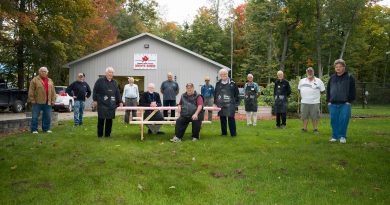Dec. 7 COVID-19 update: Active cases up, Hospitals feeling winter pressure, Omicron assessment will take months
Special to WC Online
OTTAWA – The volume of COVID-19 cases being reported in Ottawa continues to rise, but the number of people in hospital due to the coronavirus remains low.
Ottawa Public Health (OPH) is confirming another 68 new cases of COVID-19 today (Dec. 7). There have been 371 new cases in the city over the last seven days. Over the last 30 days, Ottawa has seen 364 Delta and four Omicron variant cases.
The health unit says it is tracking of 448 active cases, which is up from 321 a week ago.
Seven seven people remain in Ottawa hospitals due COVID-19, two of whom are in the intensive care unit.
No new COVID-19 deaths in the city today leaves the city’s pandemic death toll at 618.
OPH says 19 schools, three childcare centres and three healthcare institutions are dealing with ongoing COVID-19 outbreaks. The health unit is also monitoring three community outbreaks linked to recreation, a religious organization, and a multi-unit dwelling.
According to Ottawa’s vaccination dashboard, 91 per cent of residents over the age of 12 have had at least one shot of a COVID-19 vaccine and 88 per cent have now had both necessary to be considered immunized. The health unit says 87 per cent of residents over the age of five have had one shot against COVID-19 and 82 per cent have had two.
The rate of infection among Ottawa’s unvaccinated vaccine-eligible population is three times higher than it is for the fully vaccinated population. The local rate of infection per 100,000 residents for those vaccinated against the virus is at 15.3, whereas the rate for those unvaccinated (or vaccinated with one dose under 14 days) is 50.6. The rate per 100,000 residents for those who are waiting for their second shot is 38.7.
Residents being tested for COVID-19 in Ottawa are seeing positive results 2.5 per cent of the time.
Ontario is reporting 928 new COVID-19 cases and nine additional deaths on Tuesday. It is the second straight day below 1,000 cases, after the province reported three days in a row of more than 1,000 new infections.
There have been 32,401 confirmed cases of COVID-19 in Ottawa (31,335 resolved) since March of 2020.
Third vaccine does for 50 and up available Dec. 13
OTTAWA – Starting Monday, Dec. 13 at 8 a.m., individuals aged 50 and over (born in 1971 or earlier) will be eligible to schedule a third dose (booster) appointment if at least six months (168 days) have passed since their last dose.
“This aligns with the recent provincial announcement on expanded eligibility and provides Ottawa residents with an extra layer of protection against COVID-19 and its variants,” city staff released in a statement Dec. 3.
- Individuals already eligible for booster doses, who can book an appointment now, include:
- Individuals aged 70 and over (born in 1951 or earlier)
- Health care workers
- Staff and designated essential caregivers in congregate settings (such as long-term care and retirement homes)
- Individuals who received a complete series of a viral vector vaccine (two doses of the AstraZeneca vaccine or one dose of the Janssen vaccine)
- First Nation, Inuit and Métis adults (16 and over) and their non-Indigenous household members
“Ottawa residents who meet the criteria are encouraged to reach out to local pharmacies using the provincial pharmacy locator to find those that provide the booster dose,” staff said. “Some primary care physicians are also providing boosters.”
While Ottawa Public Health (OPH) continues to focus on the implementation of the vaccine for the five to 11 population, additional appointments are being allocated at its community clinics for December to support the increased vaccination demand for adult boosters.
Eligible residents can book an appointment at a community clinic through the Provincial COVID-19 Vaccination Portal or by calling the Provincial Vaccine Contact Centre at 1-833-943-3900. Drop-in spots are limited, so it is recommended to book an appointment. Please note for newly eligible adults aged 50 and older, booking will begin on Monday, Dec. 13 at 8 a.m.
The province announced on Dec. 2 a limited supply of the single dose Johnson & Johnson (Janssen) COVID-19 vaccine will be available to individuals aged 18 and over who have an allergy or contraindication to mRNA vaccines or at the request of an individual who has not yet been vaccinated. Ottawa Public Health is not currently offering this vaccine but looks forward to implementing its use in its clinics. More details will be available on how to access this vaccine in the weeks to follow.
Visit OttawaPublicHealth.ca/COVID19 to learn more about COVID-19, how you can protect yourself and others and what to do if you suspect you may be infected with the virus.
Ontario’s depleted ICU system will be challenged by winter surge
ONTARIO – Ontario’s already-depleted intensive care unit (ICU) system “will have trouble responding” to a predicted surge of winter COVID-19 cases, the Ontario’s Science Table warned in new modelling released today (Dec. 7).
Even without taking into account the spread of the new Omicron variant, the science table projects ICU occupancy will likely grow to 250 to 400 beds in January, putting hospitals under strain to keep up.
“Ontario ICUs have been under unprecedented pressure and will have trouble responding to another surge in patients,” the table wrote.
The table says that strain is being exacerbated by a “growing crisis” in staffing for critical care patients, leading to high levels of burnout.
“Despite new beds and strong management, ICUs will be challenged in responding to any new surge in patients because of staffing constraints,” the report reads.
The table says the Delta variant remains the dominant strain in Ontario, but if the Omicron variant takes hold it will “likely drive COVID-19 cases above current projections.”
In Tuesday’s modelling, the table projects cases could rise to 3,000 per day by mid-January if there’s no change in public behaviour and 30 per cent of children five to 11 are vaccinated by the end of December.
Those numbers drop dramatically if 50 per cent of kids in that cohort are vaccinated by the end of December, and even more so if additional public health measures are put in place.
The table notes “vaccine effectiveness in Ontario remains very high but experience in other countries suggests we will need to boost immunity with third doses. To control cases and the impact on our health system, we need to increase vaccination (particularly five to 11-year-olds) and continue to use public health measures to reduce transmission now. We can’t predict Omicron precisely, but it will almost certainly hit us hard and fast. This is key: We know what to do. The same measures that protected us versus Delta will protect us from Omicron: masking, ventilation, reducing contacts. We’re not back at square one.”
Expect long wait in assessing Omicron’s impact
ONTARIO – It could take months to assess Omicron’s impact on the province’s plan to ease COVID-19 restrictions, Ontario’s health minister Christine Elliott said yesterday (Dec. 6), as officials investigated a large potential cluster of the new variant.
The Middlesex-London Health Unit announced it is investigating a cluster of at least 30 COVID-19 cases with a “strong probability” of Omicron being involved.
Elliott was asked Monday about the province’s plan to loosen rules on vaccine certificates in some settings as early as Jan. 17, in light of a recent surge in cases and the emergence of the potentially dangerous new variant.
Speaking during question period, Elliott said the province has always said it would adjust its plan if the situation called for it.
“We’re planning to start lifting things but if this Omicron variant circulates widely, and if it’s a virulent as it has been in other jurisdictions, we are going to need to take a look at that,” she said. “But right now, we don’t have the pertinent information that we need in order to make a decision. I anticipate that will become evident over the next several months as we see what happens in South Africa and other jurisdictions.”
In the London area, the health unit said the number of high-risk close contacts of the suspected Omicron cluster is expected to surpass 100.
Health officials said they learned Sunday (Dec. 5) evening of two COVID-19 cases that had screened positive for a gene that is a marker for the variant. Those two people are part of the cluster of COVID-19 cases, which the health unit said is linked to travellers who returned from Nigeria in late November.
Cases associated with the cluster have been linked to several schools and child-care centres, as well as an outbreak at a church called God’s Favourite House, the health unit said.
So far, there have been at least 13 cases of the new Omicron variant confirmed in Ontario, provincial data show. The variant, believed to be more transmissible than others, was first identified in South Africa but has been detected in a number of other countries.
On Sunday, health officials in Thunder Bay, ON, said the variant was confirmed in four residents, and was anticipated to be confirmed in four more in the coming days. The Thunder Bay District Health Unit said all individuals affected are in the same household and have been isolating. The unit said there is a “direct link” to southern Africa.
Opposition politicians said the government needs to hold off on lifting any public health measures for the time being in light of the Omicron variant.
“It’s really, really troubling and if the government should have learned one thing, it’s to try to get out ahead of these things instead of wait until the very last minute and then have to scramble to make a change or to do something to address whatever’s happening with the virus,” NDP Leader Andrea Horwath said.
Ontario reported 887 new COVID-19 cases on Monday, pushing the seven-day average up to 940. The province also recorded three new deaths from the virus.
People who are not fully vaccinated accounted for 397 of Monday’s new cases, and make up 23.3 per cent of Ontario’s population, while 64 cases are in people whose vaccination status isn’t known, Elliott said.
The minister said 168 people are in intensive care units due to COVID-19, though not all hospitals report updated numbers on weekends.
Meanwhile, Toronto health officials said breakthrough COVID-19 infections have occurred in 0.17 per cent of fully vaccinated residents in the city — 3,936 cases in nearly 2.3 million Toronto residents 12 and older who were fully vaccinated at the time of the analysis.
The city said its data show that people who are unvaccinated are two times more likely to become infected with COVID-19, five times more likely to become hospitalized, and 20 times more likely to be admitted to an intensive care unit than those who are fully vaccinated.
Unvaccinated people are also four times more likely to die from COVID-19, compared with fully vaccinated people, it said.
Provincial data show just more than 90 per cent of Ontarians 12 and older have received one dose of a COVID-19 vaccine, and 87.3 per cent have two. Twenty-one per cent of children five to 11 years old have received a dose of a pediatric COVID-19 vaccine, the health minister said.










